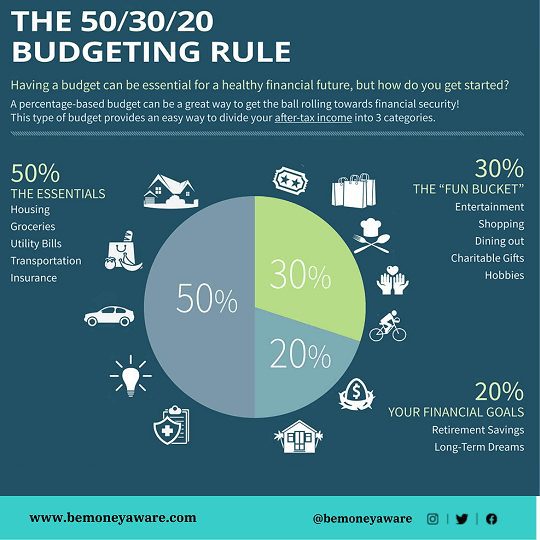When renting an apartment, there are other costs involved other than just paying your landlord every month. Utilities are usually paid by the renter, but sometimes the landlord will cover some such as sewer, water, and garbage. Electric bills, internet, and cable can add up, so it’s important to know these costs ahead of time.
Table of Contents
The 50-20-30 Budget Rule
This rule helps to break down the percentages of where your money should be going, as personal and professional life have many different aspects. The first 50% should go to your needs, which includes anything like rent, groceries, gas, and utilities. 20% should be solely made for your savings and putting away money for any retirement plans. 30% can be allocated towards wants and personal lifestyle enjoyment such as retail shopping, going to the movies, or out to dinner.
Of course, you can adjust them to your lifestyle spending needs, such as allocating 20% towards personal wants and 30% for savings and retirement. You may even feel like adjusting those numbers even lower as you can choose where you want your money to go and what fits more into your lifestyle.
Saving on Utilities
The main utilities that are not included with the monthly rent are electricity, air conditioning, heat, internet, and cable. There’s no way to get around utilities – you need them in order to live in your space, although there are a few tricks to cutting costs when you do use them.
In the winter and summer months when you are using the heat and air conditioning, turn them off or down low (or high) so they don’t turn on when you aren’t in the apartment. There’s no use heating or cooling the apartment when you are working all day, as that’s 8 hours of running time that you could be saving.
For things like internet and cable, there are cheaper plans available instead of purchasing the best-of-the-best, fastest plan. Taking advantage of streaming services like YouTube TV, Netflix and Hulu can really save you money when it comes to eliminating cable costs.
Security Deposits
Security deposits are for the landlord’s sake, to cover any damage to the apartment after you move out or when your lease is up. Usually the security deposit equals your monthly rent, although some landlords can negotiate. At the end of your lease, if there is no damage to the walls, floors, etc. then you will get all of that money back. A reminder to be prepared for the worst if something does happen where your landlord has to take that money out and depending on how bad the damage is, you may owe more if the security deposit doesn’t cover it.
So How Much Should I Be Paying?
A good rule of thumb is that your monthly rent should not be more than one-third of your monthly income. Putting it into reality, if you make 50,000 a month, you should be paying about Rs 16,600 in a month’s rent. Keeping this in mind lets you put a maximum cap on monthly rent and allows you to be in the safe zone for any other payments and saving up financially. Of course, this number percentage will fluctuate if you are comparing apartments in San Antonio versus apartments in NYC or comparing a flat in Mumbai versus house in Indore.




